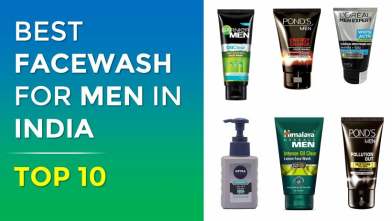Top 10 Sunscreens in India | Importance of Sunscreen: Tips for Choosing and Applying SPF
Sunscreen is a crucial component of any skincare routine, offering protection against the harmful effects of UV radiation. Understanding how to choose and apply sunscreen effectively can help safeguard your skin from sun damage, premature aging, and skin cancer. Here are some essential tips to consider:
Know Your SPF: SPF, or Sun Protection Factor, indicates the level of protection a sunscreen offers against UVB rays, which cause sunburn. Higher SPF numbers provide greater protection. Dermatologists typically recommend using a broad-spectrum sunscreen with SPF 30 or higher for adequate protection against both UVA and UVB rays.
Consider Your Skin Type: Different sunscreens are formulated for various skin types. If you have oily or acne-prone skin, opt for oil-free or non-comedogenic formulas to prevent clogged pores. For dry or sensitive skin, choose sunscreens with hydrating and gentle ingredients like hyaluronic acid or mineral-based formulations.
Water-Resistant Formulas: If you'll be swimming or sweating, opt for water-resistant sunscreens to ensure long-lasting protection. However, it's essential to reapply sunscreen every two hours, even with water-resistant formulas, as they can wear off over time.
Apply Generously and Frequently: To ensure adequate protection, apply sunscreen generously to all exposed skin areas, including the face, neck, ears, and hands. Don't forget commonly overlooked areas like the tops of your feet and the back of your neck. Reapply sunscreen every two hours or more frequently if swimming or sweating.
Layer with Other Sun Protection Measures: While sunscreen is essential, it shouldn't be your only line of defense against the sun. Wear protective clothing, such as wide-brimmed hats, sunglasses, and long-sleeved shirts, when spending extended periods outdoors. Seek shade during peak sun hours, typically between 10 a.m. and 4 p.m.
Check Expiration Dates: Sunscreen effectiveness can diminish over time, so it's crucial to check the expiration date before use. Expired sunscreen may not provide adequate protection against UV radiation, so discard any sunscreen past its expiration date.
Reapply After Swimming or Sweating: Even if you're using a water-resistant sunscreen, it's essential to reapply after swimming, sweating, or towel drying. Water and sweat can reduce sunscreen effectiveness, so reapplication is necessary to maintain protection.
By understanding the importance of sunscreen and following these tips for choosing and applying SPF effectively, you can help protect your skin from sun damage and maintain healthy, radiant skin for years to come.
Here is the List of Top 10 Sunscreens For All Skin Types
1. Neutrogena Ultra Sheer Sunscreen SPF 50+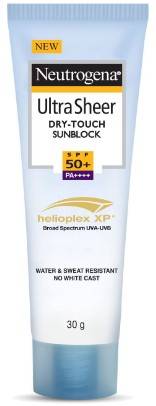 Buy from Amazon 2. The Derma Co 1% Hyaluronic Sunscreen Aqua Ultra Light Gel with SPF 50 PA++++
Buy from Amazon 2. The Derma Co 1% Hyaluronic Sunscreen Aqua Ultra Light Gel with SPF 50 PA++++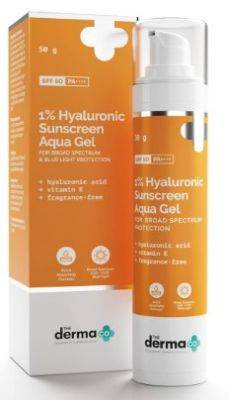 Buy from Amazon 3. Minimalist Sunscreen SPF 50 PA++++
Buy from Amazon 3. Minimalist Sunscreen SPF 50 PA++++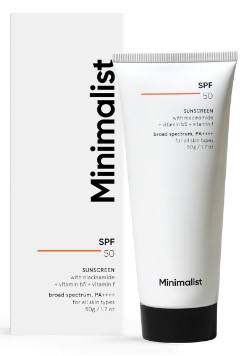 Buy from Amazon 4. Lotus Herbals Safe Sun Invisible Matte Gel Sunscreen SPF 50 PA+++
Buy from Amazon 4. Lotus Herbals Safe Sun Invisible Matte Gel Sunscreen SPF 50 PA+++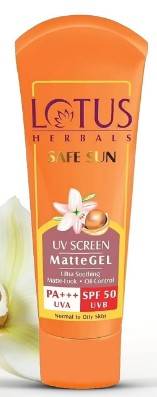 Buy from Amazon 5. Aqualogica Glow+ Dewy Sunscreen SPF 50 PA++++
Buy from Amazon 5. Aqualogica Glow+ Dewy Sunscreen SPF 50 PA++++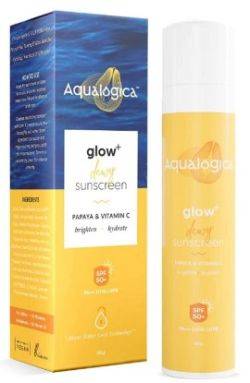 Buy from Amazon 6. Biotique Sandalwood Sunscreen Ultra Soothing Face Lotion, SPF 50+
Buy from Amazon 6. Biotique Sandalwood Sunscreen Ultra Soothing Face Lotion, SPF 50+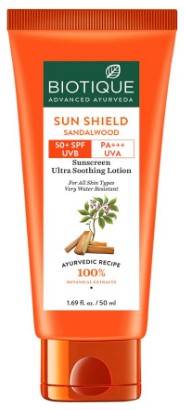 Buy from Amazon 7. Lakme Sun Expert SPF 50 PA++ Ultra Matte Lotion Sunscreen
Buy from Amazon 7. Lakme Sun Expert SPF 50 PA++ Ultra Matte Lotion Sunscreen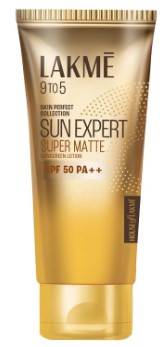 Buy from Amazon 8. RE' EQUIL Ultra Matte Dry Touch Sunscreen Gel, Matte Finish Sunscreen With Spf 50 Pa++++
Buy from Amazon 8. RE' EQUIL Ultra Matte Dry Touch Sunscreen Gel, Matte Finish Sunscreen With Spf 50 Pa++++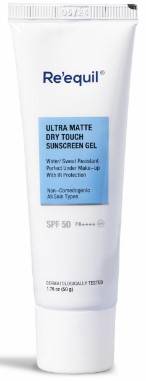 Buy from Amazon 9. Dr. Sheth's Ceramide & Vitamin C Sunscreen SPF 50+
Buy from Amazon 9. Dr. Sheth's Ceramide & Vitamin C Sunscreen SPF 50+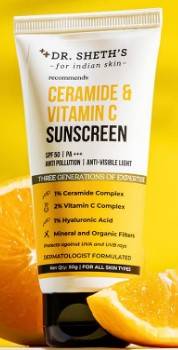 Buy from Amazon 10. Dot & Key Vitamin C + E Super Bright Sunscreen SPF 50
Buy from Amazon 10. Dot & Key Vitamin C + E Super Bright Sunscreen SPF 50 Buy from Amazon
Buy from AmazonFrequently Asked Questions (FAQs)
Q: Can I use expired sunscreen?
A: It's not recommended. Expired sunscreen may not provide adequate protection against UV radiation, so it's best to discard any sunscreen past its expiration date.
Q: How often should I reapply sunscreen?
A: It's essential to reapply sunscreen every two hours, especially if you're swimming, sweating, or towel drying. Even with water-resistant formulas, sunscreen can wear off over time, so frequent reapplication is necessary for continued protection.
Q: Is higher SPF always better?
A: While higher SPF numbers provide greater protection against UVB rays, SPF alone does not indicate protection against UVA rays. It's essential to choose a broad-spectrum sunscreen with SPF 30 or higher for adequate protection against both UVA and UVB rays.
Q: Can I skip sunscreen on cloudy days?
A: No, UV radiation can penetrate clouds, so it's essential to wear sunscreen even on cloudy days. UV rays can cause skin damage and increase the risk of skin cancer, regardless of cloud cover.
Q: Can I apply sunscreen over makeup?
A: Yes, you can apply sunscreen over makeup, but it's best to use a sunscreen spray or powder for reapplication to avoid disrupting your makeup. Look for sunscreens specifically formulated for use over makeup for convenience.
Q: Can sunscreen prevent vitamin D absorption?
A: While sunscreen can reduce vitamin D production by blocking UVB rays, it's still possible to obtain vitamin D through diet and supplements. It's essential to strike a balance between sun protection and maintaining adequate vitamin D levels.
